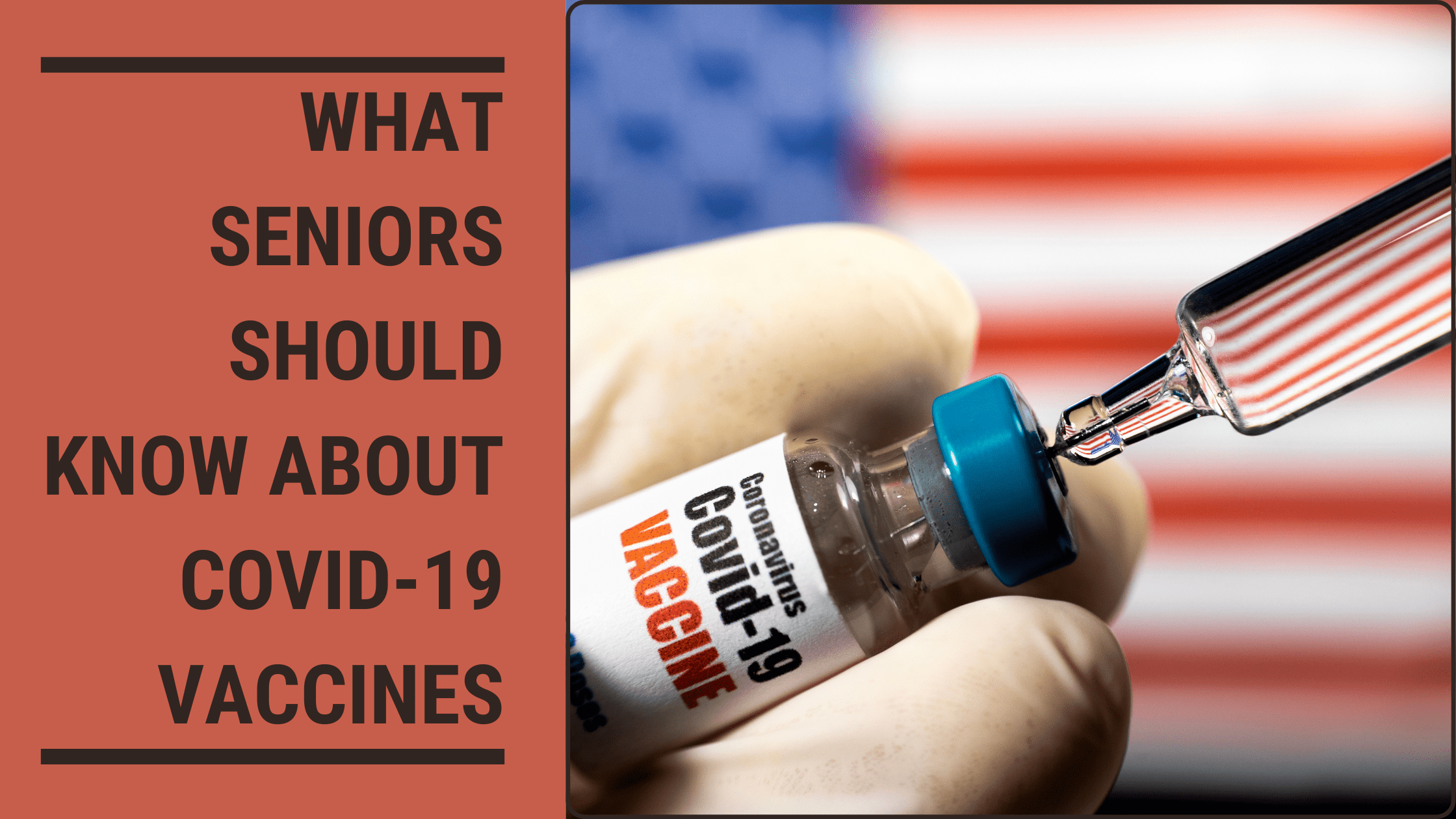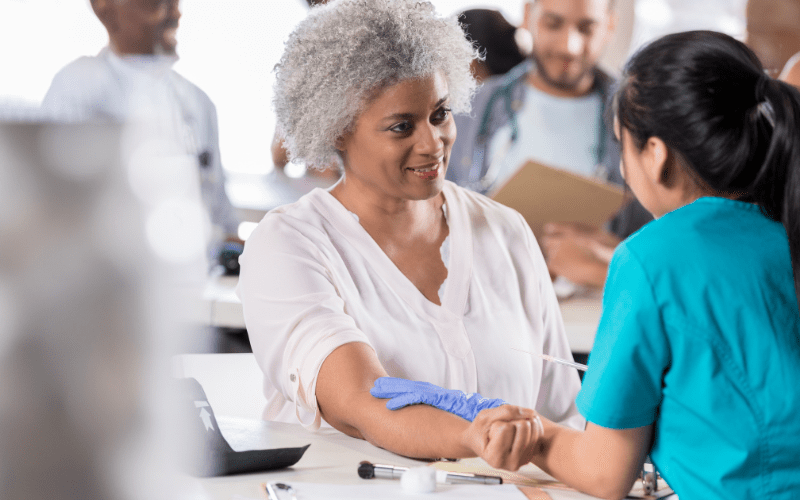
Those waiting to receive their vaccine may have several questions in the meantime. To make things easier, we explain what older adults need to know about the COVID-19 vaccines.
Updated July 19, 2022
What Should Older Adults Know About The COVID-19 Vaccines?
For seniors, the last 12 months have been particularly difficult. Whether aging in place or living in a care facility, many have been unable to see their friends and loved ones, putting them at risk of social isolation. But with the new COVID-19 vaccines, many are hopeful for the first steps toward a return to normality.
Diane Bennet, LPN, a licensed caregiver, and her husband, Don, a retired police officer and barber, were vaccinated earlier this year. To them, the relief is overwhelming. “It’s just a good feeling,” says Don, who has multiple health conditions. “I’m a lot more relaxed to go out.”
Don described how he and his wife were able to attend church services for the first time in a year. “The second shot was such a relief. I don’t feel like I have to stay secluded like I’ve been.”
“I still do my cautions with social distancing, wearing a mask, and washing my hands,” Diane added, “but I feel more comfortable going out.”
She notes that the vaccination is good for seniors in assisted living and nursing homes who have not seen their families. “It’s less isolating. I think it will take a while, but people are starting to see the light at the end of the tunnel.”
While Don experienced no reaction after vaccination, Diane had only a slight chill and fever that lasted less than 24 hours. But, she says, “It could have lasted three days, and I wouldn’t have cared because it’s better than getting the virus.”
Those waiting to receive their vaccine may have several questions in the meantime. To make things easier, we explain what older adults need to know about the COVID-19 vaccines.
Why Are Older Adults More At Risk Of Infection?
According to the CDC, adults aged 65 and older account for 8 out of 10 COVID-related deaths. The risk of hospitalization for adults between 65 and 74 is five times higher than for those between 18 and 29. Additionally, seniors are 90 times more likely to die from COVID-19.
While age is one contributor, preexisting health conditions are another. This is particularly alarming since 85% of seniors have at least one chronic health condition, while 60% have two or more.
Also, older adults typically have weaker immune systems, increasing their risk. In addition, immunity naturally declines with age since there are fewer immune cells to combat infectious diseases. For this reason, seniors must get vaccinated and protect themselves from the virus.

When Can Older Adults Receive COVID-19 Vaccines?
Front-line health care workers and seniors living in long-term care facilities will be the first to get vaccinated. After that, the next in line will be seniors 65 and older and those with preexisting health conditions.
Vaccine distribution varies by state, tribe, and territory. Check out AARP’s state-by-state vaccine distribution plan to learn more about your state’s rules. You can also visit the CDC’s health department directory to find your state agency and request more information.
Where Can Seniors Get Vaccinated?
The White House recently ordered FEMA to establish 100 community vaccination sites throughout the US. But, for now, seniors who don’t live in a long-term care facility can get vaccinated through hospitals and area health agencies. As the distribution process continues, more sites will become available. To find a vaccination site near you, visit your state’s public health website.
How Much Do COVID-19 Vaccines Cost?
Medicare covers:
- FDA-approved COVID-19 vaccines
- COVID-19 tests
- Antibody tests
- Monoclonal antibody treatments
There is no deductible or copay, and providers cannot charge administration fees. Vaccine recipients must bring their red, white, and blue Medicare card. This ensures that providers or pharmacists defer the cost under Medicare. Some vaccine providers require a form requesting the insurer group number. Medicare Part B recipients should write “N/A” or leave it empty.
Older adults must be wary of fraudulent activity. For example, some scams claim seniors must pay a fee or submit their Social Security number to receive a vaccination. However, the government will never request this information or require payment.
Which COVID-19 Vaccines Are Available?
So far, only the Pfizer-BioNTech and Moderna vaccines have received emergency use authorization (EUAs). They are also the only treatments available in the US. Each vaccine is effective against COVID-19.
Are COVID-19 Vaccines Safe?
Some wonder if the vaccine is safe since developers produced it in record time. But experts assure that the treatment is safe and effective against COVID-19. According to Carmel Dyer, MD, of UT Physicians, Pfizer and Moderna rapidly developed a treatment due to “standard procedures, coupled with newer methods of creating vaccines.”
Dyer noted that researchers had far more resources thanks to nearly unlimited funding. These resources have allowed them to open more enrollment sites and take a more dynamic approach during clinical trials.
What Are The Side Effects Of COVID-19 Vaccines?
Right now, there is not enough data to answer this question. As more people get vaccinated, researchers may discover possible long-term side effects. But, for now, most people will likely only experience mild, short-term side effects. These will most likely be similar to the yearly flu shot, such as fever, headache, or tenderness.
Can Seniors Still Get Infected After Vaccination?
It’s uncertain if people who get vaccinated are still at risk of infection or how long they will be immune. As more people receive the vaccine, researchers will closely monitor the results. People should continue wearing masks, physically distancing, and washing their hands.
“That’s something that the recipients will have to understand when they get the vaccine,” William Schaffner, an infectious disease expert and Vanderbilt University School of Medicine professor of preventative medicine, told AARP. “The vaccine provides protection, but it won’t be like a suit of armor.”
Is The Vaccine Effective If You Only Take The First Dose?
Currently, researchers are developing other treatments for COVID-19 that only require one shot. But for now, Pfizer-BioNTech’s and Moderna’s vaccines are only effective if recipients receive both doses. The CDC states that the first dose helps the immune system begin building protection. But, on the other hand, the second “is needed to get the most protection the vaccine has to offer.”
Is Vaccination Necessary For People Who Had COVID-19?

People who recover from COVID-19 develop natural immunity, temporarily protecting them from infection. However, infectious disease specialists are unsure how long this immunity will last. According to the CDC, “early evidence suggests natural immunity from COVID-19 may not last very long.” For this reason, “people may be advised to get a COVID-19 vaccine even if they have been sick with COVID-19 before.”
COVID-19 Vaccines: Info For Family Caregivers
Throughout the pandemic, thousands of family caregivers cared for their loved ones despite the risk of infection. Although front-line medical workers are at the top of the list, many states have not included family caregivers in this group. Oregon and Massachusetts are the only states that prioritize professional and family caregivers. Even still, there are strict regulations caregivers must fulfill to get vaccinated.
How Can Family Caregivers Receive Their COVID-19 Vaccines?
John Schall, the CEO of Caregiver Action Network, told Healthline that caregivers should call their local health agency to ask about their eligibility. Caregivers can also sign up for state health department or pharmacy queue systems and get alerted when they qualify.
Additionally, Schall suggested that caregivers talk to their physician or loved one’s doctor. He noted they could request a medical history assessment to learn if they qualify.
The Caregiver Action Network’s help desk is another resource for family caregivers looking for more information. Contact them online or at 855-227-3640. When family caregivers schedule an appointment, they must verify their eligibility. In addition, some states and counties require family caregivers to submit a record from their loved ones or their care team.
“You just have to go ahead and check yourself as a healthcare worker in most cases,” Schall recommended. He added that caregivers could explain their position during the appointment.
MeetCaregivers Can Help
Staying informed is a crucial part of preventing infection. You can find more information about older adults and the coronavirus on our Blog. MeetCaregivers also offer COVID-19 products and other medical equipment for family caregivers and their loved ones.
If you are a family caregiver in need of a respite break or an older adult who needs more assistance, we can help. Call us at 1 (888) 541-1136 or Find A Caregiver today.
- “Coronavirus Disease 2019 (COVID-19) Vaccine.” COVID-19 Vaccine Insurance Coverage, www.medicare.gov/coverage/coronavirus-disease-2019-covid-19-vaccine.
- Ianzito, Christina, et al. “What You Should Know About A COVID-19 Vaccine.” AARP, www.aarp.org/health/conditions-treatments/info-2020/coronavirus-vaccine-research.html.
- “Older Adults and COVID-19.” Centers for Disease Control and Prevention, Centers for Disease Control and Prevention, www.cdc.gov/coronavirus/2019-ncov/need-extra-precautions/older-adults.html.
- Ries, Julia. “What Family Caregivers Need to Know About Getting the COVID-19 Vaccine.” Healthline, Healthline Media, 28 Feb. 2021, www.healthline.com/health-news/what-family-caregivers-need-to-know-about-getting-the-covid-19-vaccine.
- Soergel, Andrew. “When Will Older Americans Get the COVID-19 Vaccine?” AARP, www.aarp.org/health/conditions-treatments/info-2020/coronavirus-vaccine-distribution.html.
- Stempak, Nicole. “What Older Adults Need to Know About the COVID-19 Vaccine.” Verywell Health, 29 Jan. 2021, www.verywellhealth.com/seniors-and-the-covid-19-vaccine-5092716.
- UT Physicians. “What Seniors Need to Know about the COVID-19 Vaccines.” UT Physicians, 22 Dec. 2020, www.utphysicians.com/what-seniors-need-to-know-about-the-covid-19-vaccines/.
